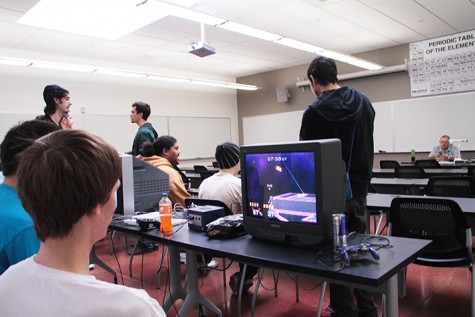Campus departments work together to distribute Chromebooks
Support Services and the Library have worked together to give out 1,200 Chromebooks to eligible students
Chromebooks are available to be handed out on-campus for American River College students in need and eligible students can apply using the application in their eServices message box. (Photo courtesy of American River College)
Almost a year after American River College moved to remote operations, some students are still experiencing technology accessibility issues. To address this, the college has created a Chromebook handout program for those in need.
Because most classes are still operating fully online, the need for a reliable and working computer has been a priority for students.
“ARC is very aware of the barriers some of our students face in getting access to the technology they need to succeed in this online environment,” ARC Public Information Officer Scott Crow said in an email. “Which is why our college and the entire Los Rios Community College District has invested significant resources into tools to support those students most in need.”
The college is currently loaning free Chromebooks and laptops, while also giving out some computers permanently.
“We have a limited amount of refurbished desktop ‘all in one’ computers for eligible students who prefer that option,” Crow said. “Desktops are not loaners and do not need to be returned.”
Jane Hoff, ARC’s lead library technician, has been on-campus distributing Chromebooks since the summer 2020 semester and keeping data on these handouts.
“I have led the processing of new devices for our library system so an accurate inventory can be managed,” Hoff said. “I’ve also been the primary on-ground contact, operating at the distribution site three-to-five days a week.”
Students who have been reviewed for Chromebook eligibility should have received an application in their eServices message center. This data comes from sources such as FAFSA applications, according to Hoff.
“We have used a variety of financial aid processes to identify students who would be lower income,” said Joshua Johnson, dean of student services. “We have also prioritized students who were new to college and who were taking courses as full-time students.”
Johnson said that even if students do not fit in a specific category such as CalWorks, they are still able to request a Chromebook.
Certain programs are considered “incompatible” for Chromebooks, and the college works to help resolve requests from these departments, according to Crow.
“There are other departments who have used grant money and departmental funding to purchase devices for the students they serve,” Hoff said. “[The] ARC Library and Operations team are facilitating getting these devices to those students as well, in collaboration with those departments.”
This Chromebook distribution has been in place since the college shutdown in March 2020 and staff are still looking for ways to help students still facing technology barriers.
“We have a digital equity committee that has spent many hours discussing how to meet the needs of students who lack access to technology,” Johnson said.















